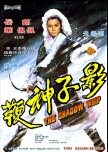
This review may contain spoilers
"We'll have to fight our way out!"
Cheng Pei Pei was one of Shaw Brothers big female stars after the success of Come Drink with Me. This time instead of a sword she wielded a deadly whip in the snow for The Shadow Whip. While the film didn't break any new ground or have memorable fight choreography it was fun and stocked with plenty of familiar faces for kung fu fans.Shadow Whip opened with stunning mountain scenery shot in the snow. It was a rare departure for SB using this kind of outdoor scenery for a big part of a movie. Pei Pei played, Miss Yun, the "niece" of a secluded inn keeper who would turn out to be the infamous Shadow Whip, Fang Cheng Tian played by Tien Feng. Ku Feng as Chief Hong, Wang Hsieh as the leader of the Serial Trio, and Yueh Hua as the earnest Wang Jian Xin all collide with Miss Yun and her comic sidekick Er (Li Kun) violently at a local inn. Later Chief Hong, the man who cast no footprints in the snow, would show up at the isolated inn owned by Miss Yun's uncle. At this point everyone believes that her "uncle" is the legendary Shadow Whip who stole 300,000 taels worth of jewelry 15 years ago, killing a respected official's family in the process. Wang's uncle had been the head of the escort service for the transport who was ruined after the theft and murders. Hong and Wang are out for revenge and a plethora of others are on the hunt for the Shadow Whip in order to steal the stolen jewels.
Miss Yun comes home at one point to find people murdered and she is surrounded by bandits led by Kao Ming. "Are you officials?" "We're the bandits of Yan Yun. I trust Fang Cheng Tian has mentioned us." She did not look frightened, more like, 'Only 16? You should have brought more men'. Her uncle showed up and the two of them made short work of the bandits with their powerful and lightning-fast whips. Later that night she takes a message to Wang and they are surrounded at the inn by what looks like all the men in the region. "We'll have to fight our way out!" It's a martial arts movie, we'd expect nothing less. Chief Hong becomes determined to kill Miss Yun when he discovers her real family name is Yang. Mmm… let's see… it's Ku Feng with a maniacal evil laugh, he's hanging out with Wang Hsieh, and keeps trying to kill the heroine. Even with Tien Feng playing the Shadow Whip it doesn't take much to connect the dots to see who the real bad guy is.
The fights were mostly with swords and the aforementioned whips. The whips were used creatively to cause much bodily harm even if it wasn't always logical or physically possible. Swords, spears, and bodies were propelled with deadly and dismembering results! The sword-fights were slightly above average for the era. And 30 years before Crouching Tiger, Hidden Dragon, this film had a flying battle in the trees. Being a wuxia, there was quite a bit of light body flying. Despite having decent sets, you could see the wires in several scenes. Pei Pei is one of my favorite action heroines. She battles fiercely and doesn't look out of place with a weapon in her hand. Even better, she was allowed to take vengeance on her enemy instead of leaving it up to the men.
The snowy scenes were beautiful and nicely highlighted the bloody battles played out on the glittering ground. Horses were ridden through the deep snow up and down the mountains and in the forests. During one scene it was nice that the snow plow from ye olden times must have cleared off the road for the horses though it would have been nice if they'd covered the tire tracks.
Yueh Hua was less stiff than usual and quite energetic in his fights. Pei Pei was gorgeous, fluid and agile in her movements, always a delight to watch. Tien Feng, normally cast as a baddie made a sympathetic whip fighter. And I'm always happy to see Ku Feng who seemed to be having a good time with this role.
The Shadow Whip wasn't a great martial arts film but the fights and plots twists were fun and Pei Pei brought her A game as always. I grade old niche movies on a curve. This film was about average but I gave it an extra bump for the spectacular scenery and a proper ending. No frozen frame as the killing blow was landed!
4/27/23
Was this review helpful to you?
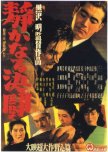
This review may contain spoilers
"Misfortune makes people stubborn"
The Quiet Duel was the second collaboration of Kurosawa Akira and Mifune Toshiro. The story was told from a field hospital during WWII and then in a small clinic for the poor right after the war. Due to the immediacy of the filming so close to the war the characters' struggles felt authentic. A young Mifune gave one of his most restrained performances as a doctor suffering in silence, refusing to give into desire or despair and living out his conscience dispensing hope to those who had less than he did.Mifune's character, Dr. Fujisaki Kyoji, performs surgery on a man in a ramshackle field hospital low on supplies. During the surgery he accidentally cuts his finger and he continues on for another hour. Kyoji discovers that the patient has syphilis, contracted from his promiscuous lifestyle. The doctor contracted syphilis but had nothing to treat it with until he was sent home much later. The treatment would take 3-5 years, maybe longer. Knowing the stigma of being considered dirty with the disease the pure in heart doctor broke off his engagement with his fiancé. Minegishi, a probationary nurse at his clinic, was snide to him when she saw him treating himself with Salvarsan. Suffering her own shame from being a pregnant, single mother, she came to take his side when she heard the reason for his suffering. Into Kyoji's personal duel of desire and conscience walked Nakata, the man he'd contracted the disease from. Nakata had refused to seek treatment and had also married and impregnated his wife. Kyoji sought to help the couple only to find Nakata as reckless with his wife's health as he was with his own.
Mifune Toshiro had to portray the doctor's silent struggle to deny the desire of his heart and his body, to kill that desire with his conscience and commitment to being a doctor. His stethoscope became his armor against his desire for the woman he loved. He was torn for he had done nothing to deserve being kept from her, so why must he suffer? Minegishi made the correlation that some patients screamed when they were in pain, others dealt with their pain quietly, dripping in sweat. Mifune did an admirable job of portraying the selfless man writhing quietly in pain, refusing to retreat from helping others.
Sanjo Miki's Minegishi had the most character growth of anyone in the film. She went from an annoying, self-pitying probationary nurse to maturing into a caring person and mother. Initially she was one who would have been screaming in pain but learned to focus her attention on becoming a better woman and nurse biding her time for the doctor she had come to love.
As a modern viewer, I did question the good doctor performing surgery. Just as he had contracted the disease from a surgical accident, couldn't a patient be at risk as well? I suppose the poor people who came to see him unable to pay had few other choices.
Kurosawa kept the framing tight, never leaving his tormented doctor's face too far from sight. He was careful to make the distinction between Kyoji, an innocent contracting the disease and Nakata, a sexual scoundrel. Of course, there are many shades of gray with this medical issue, but in 1949 he was not going to explore those.
Despite the melodrama and heartbreak, the movie did end on a hopeful note. Kyoji and Minegishi learned to walk with their chins up and face their problems head on, teaching their patients to do the same thing. They might have to suffer as well, but where there are clouds the sun is also present if you can reach high enough.
4/25/23
Was this review helpful to you?
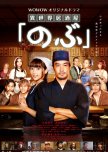
This review may contain spoilers
Where everybody knows ye olden name
Isekai Izakaya Nobu was a sweet drama featuring a wide variety of Japanese bar foods. It was very similar to the Shinya Shokudo series if the chef had been serving patrons from a medieval world with two moons that never waxed or waned differently.The classically handsome Otani Ryohei as Chef Yazawa and his Girl Friday, Takeda Rena as Senke Shinobu opened Nobu and discovered their door led to an alternate world named Aitelia, where apparently the only thing the locals had to eat was wurst and potatoes. There was a small effort to insert some German words in the first episode, and all of the characters had Germanic or English names. Everyone was badly dressed like they were going to a medieval fair, complete with blonde or red wigs.
The locals were dutifully dazzled by things like clean drinking water, beer on tap, glass mugs, and a chef's knife. More so, they yelled and screamed and emoted with every bite of flavorsome food that was offered to them. I suppose if your entire diet consisted of the same boiled food every day, and hopefully the makers of this drama were not implying that European food was that awful, fried chicken would be a reason to rejoice. They tended to lay it on thick in every episode. Despite it being a decent sandwich, I refuse to believe that discovering an egg salad sandwich was a rapturous and life changing event. Opinions may vary.
The regulars included Hans and Nicklaus, two guards of the city along with their boss, the capable Bertholdt. City worker Gernot enjoyed his Pasta Neopolitan (gonna have to trust the Japanese about spaghetti with ketchup) while the local clergy used whatever excuse he could find to join in with a glass or three of sake. The three warring water guild members became fast friends when Chef showed them the glories of eating eel. Of course, no story is complete without a villain and the head of the city council made an appearance to threaten everyone. Could good food and beer conquer all and save the day and the girl?
As fun as the drama could be, the acting was rather weak and campy. It took some time for the story to gain any traction beyond, "Wow! This is a taste explosion in my mouth! How did I never know that salted fish guts was so amazing!" How or why Nobu crossed worlds was never explained. Most importantly, I'm curious how Chef exchanged the Aitelia money to pay his bills in the real world. Did the beer vendor accept foreign, very foreign, gold coins without asking any questions?
The majority of characters were very likeable and most of the food was appealing. Overall, Nobu was an easy and relaxing watch. To quote Yentl, "And though there's nothing much to challenge your mind here, who cares when the food's so delicious?" Nobu might not be a grand destination, but as a quick trip into a pub to relax and have a tasty meal and conversation, it wasn't a bad diversion.
4/9/23
Was this review helpful to you?

This review may contain spoilers
"We don't need philosophy. We need a break."
The Warrior's Gate was a clunky but affable wish fulfillment for if not teenage boys, twelve-year-old gamer boys. The movie was reminiscent of The Forbidden Kingdom only without actual martial artists in it and any real danger for the main characters.A teenaged boy named Jack spends most of his time playing a video game as the Black Knight. His house is about to be foreclosed on which doesn't seem to bother him much. After school he works in an antique shop for Mr. Chang who gifts him a large Chinese basket/box. The next thing Jack knows Warrior Zhao (Mark Chao) and Princess Su Lin (Ni Ni) pop out of it looking for his help thinking he is the great warrior The Black Knight. Jack ends up guiding the English speaking Ni Ni through his world, taking her to the mall. When the bad guys show up to kidnap the princess, Jack has to follow them into the basket which takes him to what is supposed to be ye olden times China. Warrior Zhao and a wizard accompany him to help him free the princess with sword and magic. Along their journey, Jack teaches Zhao to break dance and swim. Dave Bautista plays Arun the Cruel, the Horrible, the Terrible, the Miserable who wants to marry the princess who is to become the Empress giving him the fast track to becoming Emperor.
Uriah Shelton was soft and non-threatening as the fish out of water who became a fighter, wooed a princess, and taught Zhao that he needed to take time to have fun. Mark Chao made for a believable warrior and was able to play the straight man to several jokes. He was so darn sexy and capable that it was hard to accept the Caucasian, timid teenager as being of any use. Before you could say "wax on, wax off", Zhao taught Jack one move in a few minutes and the next thing you knew the kid was capable of taking on battle hardened barbarians. And you knew that when he returned to the present, those bullies would be no problem and he would resolve his mom's financial problems with his mad gaming skills. Ni Ni was largely wasted as the princess though she always lit up the screen when she was on it. Bautista made for a large and properly menacing Arun the Cruel, with a few funny quirks. Francis Ng was fine as the strange Wizard who popped in and out to help the heroes. Kara Hui showed up briefly as a witch to challenge the two heroes on a narrow mountain path.
As a flight of fantasy with a thoroughly likeable cast it was not horrible. It wasn't very good either with cringe worthy humor and suffering from a white savior complex. The overly familiar paradigm was about as creative as white bread. Mark Chao and Ni Ni are such strong performers, it felt almost shameful to focus on the teenage boy. Also, the romance didn't work for me. Uriah was playing a young teenager (he was 19 when this film came out) and Ni Ni was 28. It was hard to see what the princess saw in him. Everyone speaking English was also jarring. Perhaps this film would have worked better as strictly a fantasy and not tried to make it ancient China.
This did not look like a 2016 film, but more like one from the late 1980's or early 1990's. Think Karate Kid crossed with The Forbidden Kingdom. The film must have been aimed at young boys giving them an avatar and showing poor Ni Ni in skimpy clothes. The beautiful princess of course fell in love with the nerdy kid. The inexplicable "romance" was chaste and anemic. There were a few curse words and some mostly bloodless killings if you were thinking of letting a child watch it. For adults there were no surprises in this bland and lackluster movie. It did overestimate how much this viewer could suspend her sense of disbelief on too many occasions. The thoughts that kept me most occupied during this film were ones wishing Mark Chao and Ni Ni would work together again in their own movie or drama with no fish out of water gamer to ruin the illusion.
4/5/23
Was this review helpful to you?

This review may contain spoilers
"Breaking one arrow is easy, a bundle is not"
A Home with a View is a rather typical Hong Kong comedy with lots of yelling and manic action. What sets it apart is its theme about overcrowded living spaces in the densely populated city and the emotional pressure it puts on the residents crammed into their homes. The overacting and nearly constant yelling could be off-putting, but the story underneath had a current of societal desperation and sinister truth running through it.The Lo family lives in a crowded apartment which gives them no real privacy. They are paying a large mortgage in order to have a slice of visibility of the harbor. Tempers erupt on a regular basis, but are soothed when the family clusters around the small window and drink in the tiny tranquil view of nature. They live in a building with people as crazy, er, eccentric as themselves. Unaware of their own distracting noise, the mother picks fights with the butcher (Lam Suet) who lives upstairs while the kids yell at the old man below whose tobacco smoke drifts into their apartment at dinner time. While the father seeks peace with the neighbors, sometimes in an overly generous fashion, the rest of the family pretty much finds themselves in conflict with everyone. This is not just a failing on their part, no one around them is looking for harmony with each other either. The contentious Lo family's only pressure valve is threatened when a callous neighbor erects a garish billboard with Karl Maka's face on it obstructing their view.
Wong (Louis Koo), a lonely man who feels unseen, refuses to take down the billboard, relishing the attention. The family runs up against an immovable and uncaring bureaucratic wall of paper. A fight over whether it's art or advertising ensues. Ultimately, the family is found in the right, but the process for removing the hated monstrosity could take years or even decades. They can't even sell their flat as the loss of the harbor view drastically devalued their home. Meanwhile the family is slowly descending into madness without their precious view. The film takes a dark turn as they run out of options and coping mechanisms.
There were some odd scenes thrown into the mix. A truly unique teenage pregnancy scene where it comes to light helping a schoolmate deliver a baby will earn you a demerit. You also would not want to do battle with Mama Lo over a fish in the market. Every element of society seemed on edge in the manmade cement prison.
The family was not alone in its need for something to bring them peace. The offending butcher above found nightly peace in his pork pies. The old man dying of cancer below escaped into his evening smokes and eventually into death. The Lo family dealt with their existential crisis in a decidedly permanent manner. The film explored family and the people struggling daily to survive financially and with their sanity intact in the overcrowded city. The Lo Family united first at their serene window, then in their fight against Wong, and in the end…their madness.
4/4/23
Was this review helpful to you?

This review may contain spoilers
What's love got to do with it?
Pearl Chang Ling starred as the Invincible Swordswoman, or in this movie's case, The Heavenly Swordswoman Pai Yu Sung. This wuxia had it all-death, revenge, multiple betrayals, disguises, and unrequited love. Death and maiming occurred via swords, bamboo spikes, poison darts, and iron hands. And what would a Ming Dynasty martial arts movie be without a duplicitous and deadly eunuch guiding the evil events?Pai Yu Sung had disappeared after the death of her father by the Eunuch Ma Tang. She returned as the man Pai Tong about the time the bad guys were searching for her to kill her and the good guys were searching for her to help them. Tu Yueh Pian hated and loved her. When they were young he'd been obsessively in love with her and wanted to be close to her, resulting in their master blinding his one eye when he tried to take advantage of her. Yung Tsin Tsin, Tu's old classmate wanted Pai dead because she was in love with Tu and was obsessively jealous of the great swordswoman. The Eunuch Ma Tung who had Pai's father killed wanted her dead as well because he thought she was a threat to him. The woman had more enemies than she knew what to do with. A strange beggar named Lee Chiu ended up taking her side and watching her back.
A kung fu tournament was held to try and draw Pai out. It would be a chance for the bad guys to kill her and the good guys to use her to take a secret box with evidence against Ma Tang to the proper authorities. The tournament was held on a spectacular set built of bamboo spears. The combatants had to fight using the weapon of their choice on the top of the spears. Lo Lieh showed up with a metal hand that had an endless supply of poison darts. After winning her fights, Pai met with the young master Wang to take possession of the secret box and the betrayals, impersonations, poisonings, and killings began in earnest and did not end until the final credits.
Pearl made for a confident swordswoman who was seeking justice for her father. Cliff Lok as Lee/Ni Chiu, at first seemed to be the comic relief but evolved into one of the most important and sympathetic characters. Tsung Hua's Tu Yueh Pian, was far from sympathetic and I'm still not sure what the writer wanted us to feel about him. His angry obsessive "love" seemed to only make Pearl and me feel repulsion. Chiang Ming's Ma Tang came across as almost super human with a magical throne. Yueh Hua had brief appearances at the beginning and the end of the film. Fan Ling as the jealous Tsin Tsin swung her sword with authority as she grudgingly gained respect for Pai and sided with her in the battle against Ma.
Most of the sword-fights were quite good for this era, a little above swing and fall. There was quite a bit of wuxia light body work, aka wire-fu, for those who are averse to it. The tournament on bamboo spears occupied much of the middle of the film and used diverse enough skills to keep it interesting along with several subsequent impalements. And then as now, when a cross-dressing character's hair was let down, everyone knew Pai Tong was a woman. Men had long hair as well, so I've never figured that one out, but those are the genre's rules. The final battle was one of skill and heart as the good guys fell at an alarming rate against the invincible Ma's three sword attack. Almost no one walked away into the sunset after this movie's blood baths.
I quite enjoyed Pearl's performance and surprisingly for me Cliff Lok's. The fights were fast and entertaining with enough carnage to make them credible even with the moments of flight. If you enjoy old martial arts films, this is one to try. As always, I grade these low budget niche films on a curve.
3/22/23
Was this review helpful to you?

This review may contain spoilers
Don't mess with her sister!
A Girl Called Tigress, a typical low budget Taiwanese kung fu flick, had a few things working in its favor. Polly Shang Kuan Ling Feng played a dual role, Kurata Yasuaki delivered his usual menacing villain role, and before he was typecast in villain roles, "Mallet Fist" Chin Kang played a good guy. There was even a semblance of a story that wasn't based on a secret list!Polly played Shu Fung, a hot headed martial artist who was searching for her mild mannered twin sister, Mishi. When she stopped on her journey for a quick bite to eat she was accosted by several thugs. Big mistake on their part. After Polly had a table flipping, face kicking good time, the thugs ran off with their tails between their legs. Per usual, thugs in martial arts movies have plenty of other jerks to call on and they waited for her in the woods. As she was holding them off, Chin Kang arrived to help her out. Everyone thought she was Big Bad Chiau Kung's woman, who of course turned out to be her sister. Chin Kang was in town to solve a murder and several thefts. Mishi, the twin sister, had gotten into a "Runaway Joe" situation when she left her family to be with A Chung, the unlucky thief who died at the hands of Chiau Kung. Chiau had kept Mishi locked in his compound ever since. Eventually, all the parties collided as Shu Fung attempted to free her sister from Chiau and Chin Kang sought the evidence to arrest Chiau on, while Chiau and his gang tried to kill all the other parties involved including a rival boss who owned a brick kiln where the goods had been hidden! Suffice to say, there were plenty of fights!
Lung Fong's and Leung Siu Chung's fight choreography was kick heavy and Polly was athletic and fierce enough to keep up. Kurata was fast and as always, fun to watch. Chin Kang's size and surprising agility along with his meaty fists made for entertaining fights as well. I was pleased that Polly's character was able to dish out the final vengeance instead of leaving it to the larger Chin Kang. The cast boasted a large number of actors who could double as stuntmen and they made the hits and kicks convincing as they flew and tumbled backwards. The final long fight's choreography was done well enough to make it believable, not an easy task when having an actress spar with Kurata.
Polly played cocky in a way that wasn't a turnoff and took no prisoners with her attitude. Chin Kang made for a likeable good guy. He, like Lo Lieh, would end up largely typecast as villains during their careers. Kurata Yasuaki, a real-life karate expert, played menacing and skeevy like no one else.
This movie will not go down as a great kung fu flick or even one of Polly's best, but it delivered what it promised-double the Polly and almost non-stop action with a mostly coherent story. For fans of Polly Shang Kuan Ling Feng and old martial arts movies that's usually enough.
3/22/23
Was this review helpful to you?
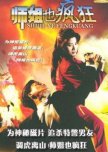
This review may contain spoilers
Absurd and lewd
This Yes Madam is not to be confused with Cynthia Khan's other movie Yes Madam 2 (1988) or Michelle Yeoh's Yes Madam (1985). While Cynthia Khan did play a cop, the movie veered into the fantasy realm with the most oddball villains and good guys. The story refused to be taken seriously resulting in a headache of a viewing experience trying to make sense of the haphazard script and even worse acting.This review will be short as the movie was not entertaining for me. Cynthia Khan played a cop for the A-Team and her boyfriend was a security guard who happened to break up a criminals' fight and ended up with a book filled with money. The bad guys wanted the book back. The boyfriend's family ended up being kidnapped by the bad guys in exchange for the book. Two gangs of bad guys double-crossed each other making an exchange for the merchandise resulting in the most ridiculous and poorly choreographed fight scenes I've ever seen.
The bad and the strange: Starting first with the boyfriend's family---The sister was over the top strange. She was shown making an elaborate meal for the cat but only ordered delivery pizza from a guy dressed as Superman for the family with a stack of boxes from previous meals sitting in the corner. One young boy dressed like Goku (Dragonball) and practiced kung fu in his room. The other lecherous child had the magical power to steal women's bras and panties off their bodies. And for some reason there was a pin-up poster of a half-naked woman hanging in the dining room behind the dining table. Khan's boss was also pervy. The bad guys looked like they were cos-playing anime baddies wearing strange costumes and hair pieces. Several of them had face paint or huge owl-like eyebrows.
The story made no sense, beginning with the first random fight right up until the final scene. The writers threw in the most arbitrary things which made scenes even more chaotic and incomprehensible. This is a movie only for those who love absurd Taiwanese films with lewd humor. For me, this movie was a beating and I am happy to have it in my rearview mirror.
3/19/23
Was this review helpful to you?
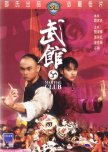
This review may contain spoilers
Miss Manners for martial arts
Martial Club followed Wong Fei Hung from goofball show-off to accomplished and more thoughtful fighter. Though the story wasn't too compelling it had some interesting fights in it. Gordon Liu, Robert Mak, and Kara Hui as three young fighters from two different schools had a nice, if not too dynamic camaraderie. If it feels like I'm damning this movie with faint praise, I probably am.The movie opens with an elaborate Lion Dance that is interrupted by a rival school led by Lu Zheng Fu (Chu Tit Wo). Wong Fei Hung's father (Ku Feng) and Master Zheng Tian Shou (Wilson Tong) attempt to keep the peace with the troublesome school. Meanwhile, Wong Fei Hung and his buddy Wang Jinlin (Mak) have more fun horsing around and picking fights with paid marks than they do actually training at their respective martial arts schools. Wang Juying (Hui) has a crush on WFH and runs interference for her brother Jinlin. Along comes Master Shan Xiong (Johnny Wang), a fellow from the North, and apparently all people from the north are considered rubes and less intelligent, in a classic case of miscommunication, he delivers a punishing blow to Jinlin, stopping short of killing him. The aftermath causes WFH to rethink his devil may care attitude and he decides to commit to his training while Jinlin continues to hang out at the brothels.
Shan joins up with an old acquaintance at the rival school to the other two. Think Slytherin vs Hufflepuff and Gryffindor. The shady Lu's son (King Lee) and his buddies trick Jinlin at the brothel and nearly beat him to death doing nothing to help the tension between the schools. Afterwards, Lu invites the others to a Cantonese opera and then tries to have them arrested for watching the show without a ticket. An extended free for all brawl takes place until Papa Wong shows up and calms everyone down. Master Shan refrains from any of the infighting and often restrains the Lu family when he can. He tests WFH on his martial courtesy and is pleased. The two have a "friendly" duel in the Zig Zag Alley which was the highlight of the film. And then a pointless and abrupt ending.
There was little to complain about with the fights. Gordon, Robert, Kara, and Johnny were a delight to watch as always. Hsiao Ho also showed up to add some acrobatics. Gordon and Johnny's duel showcased a number of styles well done, especially as the alleyway became narrower and narrower. Kara was an elegant fighter, even if her character was a bit of a hothead. Lau Kar Leung, King Lee, and Hsiao Ho provided the creative martial arts choreography managing to make huge brawls and one-on-one fights interesting.
The problem I had with the film was that there wasn't anything really at stake except for school pride. Though the Lu School played dirty, they never received any punishment for their misdeeds because everyone was too polite and more concerned with keeping the peace. The film was largely about loyalty and martial arts decorum, manners if you will. The implied crush between WFH and Juying had no spark to it, at least on his part. Kara looked like she was trying to make some chemistry happen, but came up against Gordon's stony façade. The friendship between WFH and Jinlin faded as WFH separated himself skill-wise. Other than WFH's seemingly overnight maturity and leap in abilities, nothing actually happened in this movie except for a bunch of fights between the schools.
What I did really like. When I see Johnny Wang's name on a cast list, I immediately know who the Big Bad or the Big Bad's #1 henchman is going to be. Johnny nearly always plays a villain. This is the first film I've ever seen him play a reasonable, fair, moral character and he did a good job at it. It's a shame he didn't have more morally righteous or at least gray characters. Seeing him smile at WFH's courtesy and abilities and not because he'd just murdered a small town was something I didn't know I needed.
Things I learned about the Lion Dance and life:
#1-A lion should never smell another lion's butt. #2-There should be no blinking at another lion. #3-Do not approach another lion with a raised foot.
Martial Club had quality fights and a likeable cast. It just lacked that special spark to make it memorable. Any kung fu movie that could tame Johnny Wang might be too polite for the genre. Who knew making an exciting movie about martial arts manners could be so difficult?
3/15/23
Was this review helpful to you?

This review may contain spoilers
Bromance times four!
Shaw Brother classic, The Crippled Avengers, may have had an unfortunate dated title, but it was old school kung fu fun. Director Chang Cheh wasn't too interested in realism instead he gave the audience a spectacle which at times more resembled a circus acrobatic act than it did a martial arts throw down. The Five Venoms (the group of actors, not the characters) teamed up once again, this time to take on a butchering bad guy.Hero Chen Kuan Tai's Black Tiger came home to find his wife dead and his son's arms cut off. He quickly dispatched the hatchet men and made a 180 into villainy. Through the years he provided his son, Lu Feng (Venom Centipede) with new and improved metal arms and hands, training him in the three Tiger Styles. Anyone who crossed them or spoke a word against them incurred their wrath. Johnny Wang acted as his chief enforcer Wan.
Along came the Venoms. Philip Kwok (Venom Lizard) made the mistake of looking at the son's metal hands and was blinded. Lo Meng (Venom Toad) spoke out against The Black Tiger's cruelty and was made mute and deaf. Sun Chien (Venom Scorpion) bumped into the son and lost his feet. Chiang Sheng (Venom apprentice) confronted the Black Tiger over his ruthlessness and had his skull crushed leaving him brain damaged. The four men made their way to each other and took Chiang home to his master. His master vowed to teach them kung fu styles to overcome their disabilities. For three years they trained before returning to confront their nemesis and his gang.
The training scenes were quite fun to watch as Chiang and Kwok were quick and acrobatic. Any fights with them and/or Lu Feng didn't need wire work because they could jump, flip and tumble with the best of them. Kwok's abilities with the metal pole and rings were fast and amazing to watch. Chiang always looked like gravity didn't apply to him as he tumbled off of and onto furniture. Lo Meng, though trained in martial arts tended to do more kung fu posing. The "Shaolin Hercules" never met a shirt he wanted to wear and liked to show off his muscles. Though one of the main four characters, Sun Chien and his metal legs tended to disappear for long stretches of time showing up just when someone needed a deadly kick. This was not Bruce Lee kung fu, it was kung fun, more theatrical than useful.
Though the main characters were all disabled, there was no humor at their expense. The best part of the whole film was the obvious camaraderie between the men as they relied on each other to survive. It was a buddy movie times four. Lo Meng's Wei and Kwok's Chen, the deaf man and the blind man, were quite heartwarming in their tactile friendship as they protected each other. For a 1970's kung fu movie, it was fairly sensitive, admittedly the bar was set pretty low on that subject, but at least there was some effort in the machismo genre.
I enjoyed this movie more than the Five Venoms and thought the fights were more original and at least some of them were quicker. The story wasn't afraid to embrace the ridiculous with things like a character having bionic arms who could shoot darts out of them. But it was the more human aspects of the movie that made it memorable. The friendships that developed between the main characters and the characters' growth were unusual for this genre where relationships often took a back seat to fighting. I found those aspects of the movie refreshing. For anyone who enjoys old kung fu movies, this is definitely one to give a try, even with the horrible title.
3/14/23
Was this review helpful to you?

This review may contain spoilers
Dorian "Flash Legs" Tan showed how he received his nickname in this movie as he kicked, slapped and popped with his fast and graceful kicks. Shaolin Deadly Kicks was an average Taiwanese martial arts film with a strong cast and consistent story. Dorian had a nice screen charisma to smooth over some of the weaker moments in the film.Dorian's Hung Yi hunts down the scattered members of the Eight Dragon gang. Three years ago they had stolen a secret octagonal treasure map and divided it among the 8 gang members. Holy story convenience Batman! More than bringing in the bad guys he's trying to collect the pieces of the map and return it to the temple the gang stole it from. The pieces don't come easy with numerous fights along the way. Dorian faced harm from farm implements, deadly wheel barrows, swords, explosives, hidden weapon traps, chains, bamboo spears, ropes, leap frog kung fu and a giant. Along the way he meets the comely and dangerous Doris Lung, daughter of one of the gang members.
The story, while thin, stayed on track and remained somewhat comprehensible, something more than a few martial arts movies from this time can't boast. Like many movies filmed in Taiwan, this title is in desperate need of restoration. It was dark, faded and grainy. The fights were typical of the 70's, slow and jerky yet the actors made them entertaining. They did make use of wire work, but the majority of fighting was on the ground. Instead of kung fu, Dorian used taekwondo, with his extremely limber and strong legs. He could pop, pop, pop up the bad guys' bodies and then slap or kick them with his feet in their faces.
Dorian is not the most emotive actor but he's entertaining to watch. Lo Lieh showed up as a scarred bad guy and he always brings energy to his supporting roles. Wang Hsieh made his menacing appearance as a deadly member of the Dragon gang. Doris Lung was a nice love interest who could hold her own in a fight. Lung Fei, Tsai Hung, Chin Kang, and Lu Ti rounded out the main partial map carrying members of the gang. There was a nice variety of characters in the gang. A few were completely murderous and others had come to have regrets about the life they had lived.
Things I learned from this movie. #1 Never turn your back on your mortal enemy. #2 Never carry a pocketful of fragile explosives to a fight.
Shaolin Deadly Kicks won't go down as one of the great kung fu flicks from the 70's but for a bargain basement Hong Kong movie filmed in Taiwan it was entertaining enough even with a rather abrupt ending. Probably of most interest to Dorian Tan fans. As always, I grade these old martial arts movies on a curve.
3/11/23
Was this review helpful to you?
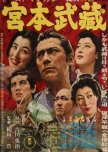
This review may contain spoilers
Samurai 1: Musashi Miyamoto is the first in a Samurai trilogy starring the charismatic Mifune Toshiro as the titular legendary swordsman. This film sets up the story from the time he was a brash "lawless" teenager looking to become a samurai to the point when his wild will is tamed.Mifune was already thirty-four when this film was released and looked every bit a man, but he did try to give Takezo a younger man's emotional vulnerability. Takezo as he was called in his youth and his buddy Matahachi run off and join the wrong side of the Sekigahara Battle. Carrying a wounded Matahachi, the two end up at a hut with a mother and daughter. The women take them in and care for them until bandits show up. Takezo fights them off while Matahachi and the daughter Akemi take the more expensive items the women have stripped off of fallen samurai to hide. When the mom, Oko, puts the moves on Takezo (just like her daughter had done before her), the young man refuses her and runs to the river to bathe. Upon returning he finds that everyone, including his feckless buddy, have evacuated the premises. When he arrives at his home village, he's turned into a fugitive because Matahachi's mother and the rest of the villagers want their pound of flesh from him for supposedly abandoning Matahachi! Eventually the local Buddhist priest talks him into turning himself in. Matahachi's ex-fiance, Otsu, who received a letter from his new wife is now firmly on Takezo's side and frees him and runs away with him. She is later captured and in the process of attempting to save her, Takezo is once again caught or better, rescued, by the priest who locks him in a room filled with Buddhist texts. Three years later, he's calmed down, more enlightened and ready to travel the wilds in order to further his training. He is gifted with a new name---Musashi Miyamoto.
The film was beautifully shot in color which showed off the stunning scenery as Takezo traveled through the countryside. The battle scenes captured the fear many of the men felt as they were outnumbered and literally outgunned by the opposing side during the great fight. The tall grasses and trees could come monotonous though when Takezo was relentlessly hunted by the people from his village.
That same monotony began to set in with me when a large part of the film was devoted to Takezo being chased and hounded on the thinnest of charges. He'd come home to let Matahachi's mother know her son was alive though he wouldn't give the shameful reason why he hadn't returned home and in return Takezo was left out to dry. Though all this might have been to show his untamed and fierce nature, it dragged on too long for me. It mirrored Takezo attempting to tame Akemi's wild stallion. He never did through force. The priest's gentle nature and spirituality was able to reach deep within his depths and help calm the young man and center him. I would have loved to have seen the actual growth period in Takezo instead of skipping over it. He went from unfocused and out of control to self-disciplined with more insight. It would be like a baking show giving all the main ingredients and then displaying an ornately decorated cake without showing how it was made. I want to see how he went from a bare-footed, half-naked, wild-eyed teenager to a confident, restrained, and dare I say it, elegant looking young man.
Aside from the journey of self, this film was helped by the powerful presence of Mifune Toshiro who went through a gamut of emotions believably. I don't know if this film would have succeeded in lesser hands. As with many of these 1950's film, the women's characters didn't fare so well. Akemi and her mother both throw themselves at Takezo, with the mother lying that Takezo attempted to assault her. Akemi's mother contemplates selling her near the end of the film. Otsu goes from completely devoted to Matahachi to eternal devotion to Takezo. And Matahachi's mother refuses to listen to reason so deep is her bloodlust.
I wouldn't be honest if I didn't say I was underwhelmed with this film aside from Mifune's energetic performance. However, I am looking forward to the second film and seeing where Musashi's journey of self-discovery and swordplay take him.
3/8/23
Was this review helpful to you?
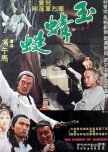
This review may contain spoilers
"You're not known as a hard man for nothing!"
The Murder of Murders aka The Massive is not your typical revenge kung fu flick. It's a murder mystery where nearly everyone in town is hiding a secret and wants to find a fortune in stolen gems with a little kung fu thrown in for good measure.The Jade Dragonfly, a jewel thief, has been hitting all the major cities. When Lo Lieh comes rolling into town and wanting to buy some jewels at a high end shop it doesn't take a genius to know who the culprit is. He manages to get away with 6 precious stones but not before the town's inspector tells him everyone in the shop is a suspect and he'd better not leave town. If the thief isn't caught in five days, the inspector will resign. It seems like everyone in town is hunting for the stolen gem stones. Lo Lieh seems unbothered and has no problem dealing with the cops and baddies until he's poisoned and dies on the spot.
The Jade Dragonfly's brother, Chi Kuan Chun, shows up looking for his brother's killer and he has a plethora of people to choose from. The local gambling den boss, Yi Yuan, and his gang of thugs, including Phillip Ko Fei, Lei Ming, Lee Chiu, and Shih Ting Ken all have had motive and opportunity. Yueh Hua shows up as an art forger with a bad habit of serving suspicious tea. Miao Tien plays The Light in the Darkness, an assassin who uses a pole with a paper lantern to fight his opponents. Phillip Ko Fei uses a pipe with 490 poisoned tipped darts and Lei Ming has a poison dart fan. Chin Kang is the no nonsense straight arrow hard fisted Inspector. As a fan of Taiwanese kung fu movies, it's a grand slam of actors and stunt men to enjoy fighting as they scramble to be the one to obtain the stones. As one character says, "Never think a man has enough money because that's a lie." There are a couple of twists at the end of the movie that given the casting didn't seem too surprising but gave a little depth to the plot.
Lee Chiu was the martial arts director. Most of the fights were decently fast with a variety of weapons as stated before. The fight between Chi Kuan Chun and Yueh Hua was a stiff as Yueh's acting. The fights featuring Chi and either Phillip Ko Fei or Lee Chiu or Chin Kang were far more entertaining. A couple of fights were shot in the dark and with the aged film's fading were more difficult to see.
The Murder of Murders was a fun "who done it?" with plenty of villains and shady characters to choose from keeping the guessing going until the last minute. The fights were better than average 1970's caliber especially for low budget Taiwanese fare. As always, I grade on a curve for these old kung fu films.
3/6/23
Was this review helpful to you?
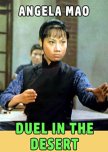
Dud in the Desert
Duel in the Desert is what you get when you mix a convoluted story, bad direction, poor martial arts choreography, and almost no Angela Mao---few duels and more duds.The story starts with everyone converging on the inn Angela's family runs to find a place to stay so that they can take part in a horse race with a 500 gold tael purse. And that's the end of that storyline. Pai Ying and Hsieh Han, along with Wan Chung Shan are looking to make money on a deal regarding 3 treasure chests full of Imperial jewels. Unfortunately for them so are a lot of other people. Theft, revenge, subterfuge, a murder case, betrayal, a secret letter (there's always a secret letter or book!), deals and double dealings, hidden identities, and undercover police officers are shuffled together in hopes of finding a story.
To make matters worse there were few fights and even those weren't very good. Most of them were of the grab, lock, pose kind. Don Wong and Ling Yun had a fight that moved faster and didn't seem as posed. In many of the other fights you could see how far people missed their hits and kicks. Angela is always a delight to watch but she only had a short fight at the one hour mark and in the final couple minutes of the movie. Even her kicks, fierce gaze, and snake kung fu couldn't save this film.
The version I watched was dubbed which might have been fortunate. The film was faded and badly cropped, subtitles would have been hard to read and run off the screen. People's faces were almost completely cut out of some scenes due to the cropping.
If there had been some good fights and more Angela it might have made up for the ridiculous story and all the people running around trying to either steal the jewels or save the jewels. Either way, this is a film only for lovers of 70's Taiwanese kung fu movies and Angela Mao and even then it might require a great deal of patience on the viewer's part.
3/1/23
Was this review helpful to you?
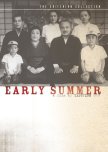
This review may contain spoilers
"It's like when you look for something all over the place & then find it right in front of you."
In Early Summer a family faces a time of transition and growth as the twenty-eight-year-old daughter's unmarried status seems to reach a crisis point with everyone wanting her married off, even her boss plays matchmaker! This poor "old maid" seems quite happy enough working, hanging out with her friends, and helping her family, but society norms being what they were, she understands her time of being single is fast running out.Ozu slowly takes his time setting up the characters and family dynamics in his usual aesthetic manner. The plot is not complex but the relationships are. Noriko is the "old maid" and seems fairly nonplussed when her boss tries to match her with an older friend of his. Her authoritarian brother, Koichi, jumps at the chance for her to be married to a wealthy older man. Noriko's mother and sister-in-law express their doubts about the match when they hear the man is forty. Koichi shuts them down saying that at Noriko's age, beggars can't be choosers.
When Koichi's two young sons run away after an argument with their father and can't be found, Noriko goes to a neighbor whose widowed son and small daughter live with her. The son, Kenkichi, goes with Noriko to help her find the boys off-screen. Kenkichi is a doctor and is later offered a promotion from his boss, Koichi, at a provincial hospital. Noriko takes a farewell gift to his house and before she leaves, she and Kenkichi's mother have arranged for her and Kenkichi to be married without his or her parents' knowledge or permission! How terribly forward and untraditional! Kenkichi is delighted, her parents not so much. "She acts like she grew up all by herself." Even though the family knows and respects Kenkichi, he's not wealthy and worst of all, he already has a child. Noriko loves the little girl and can't understand what the problem is.
The father goes to the store and has to wait for a train to pass by. Just like his teapot, trains play a big part in most of Ozu's films. Subconsciously, we know that trains are either taking people to somewhere or away from somewhere. Here the movement within the family is spurred by Noriko making a decision for herself, she's not only moving physically away from her family, but also away from the family's sphere of influence. The father realizes his family is transforming and that the train will soon be taking his daughter away as much as he would love for his family to stay together.
Always hesitant to show much romance, Ozu finally lets Noriko give voice to why she made what looked like a rash decision.
She admits her long standing feelings for Kenkichi. He's someone she trusts and knows she will be happy with. Her best friend reveals to Noriko that what she's talking about is love. Noriko doesn't always come across as the sharpest knife in the drawer with her perma-smile and sunny disposition, but even she knew that marrying a man who had been resolutely a bachelor until forty might make for a difficult relationship no matter how much money he had. Better to clip coupons and work on a blended family as a stepmother with someone she cares for than to be on unequal footing with an older stranger.
"It's like when you look for something all over the place, and you find it was right in front of you all along."
The acting in this film was uneven for me. It was interesting seeing Ozu regular Ryu as the older brother with jet black hair. Two years after this film, he would play an elderly father role with the actress who played the mother in this film in Tokyo Story. In Tokyo Twilight he played Hara's father! I have a love-hate relationship with Hara Setsuko. When she's given the chance to show a range of emotions, I find her compelling. I have a more difficult time when no matter what happens on screen, whether she's been offered congratulations or told she has six months to live she responds with the same smiling face. It can feel like a mask hiding the character's true emotions and I would like to see the depth of the character played out more.
Single, childless Ozu has more than once had two young brothers in his films, Good Morning and I Was Born…But, come to mind. In the films I've seen thus far, and also in this one, the boys are very disrespectful, selfish, and throw fits on a regular basis. Maybe it's because the kids always seem cooped up in the house like the caged birds in this film that they go stir crazy. More than likely, it's how someone who is childless sees children, but I find the children in his films can cross the line from delightfully realistic to incredibly annoying. There was a some of both in this film.
Unlike some of Ozu's older films where tradition must be maintained in the family and with fear of modern influences damaging the familial structure, Noriko is not punished for making her own decision regarding her future. No train runs her down nor is there a disaster to her reputation. I found this different direction with more sympathy toward the young people by the director a breath of fresh air.
Just like the sunny, carefree days of summer seem as if they will last forever, we know fall is around the corner. It doesn't mean the end of the world but it is a time of transition, even as Noriko's family had to accept that change is inevitable. Life is always in flux and families have to be flexible. Much like the family portrait taken in the film with the parents and their children and grandchildren, the last photo is only of the parents. In time, most parents will see their children move out to make lives of their own and be left by themselves with a much quieter house.
After Noriko is wed, again off-screen, and her brother and his family have moved due to his job, her parents talk about their lives. The father laments, "I wish we could live together forever, but that's impossible." On reflection they realize that they have lived a good life and raised their children well. They have earned their, if not happy, at least pleasant and contented ending.
2/23/23
Was this review helpful to you?

 37
37 114
114 7
7





















